Overview
In the demanding world of healthcare, providers often face overwhelming administrative burdens that can detract from their primary focus: patient care. This article identifies seven free medical speech-to-text tools designed to alleviate these challenges and enhance both efficiency and compassion in practice.
Imagine a tool that allows you to document patient interactions quickly and accurately, giving you more time to connect with those you care for. Tools like CosmaNeura, Nuance Dragon Medical One, and Google Docs Voice Typing each offer unique features that can significantly improve your workflow. By streamlining documentation, these solutions not only save time but also enhance the quality of care you provide.
Consider how much more fulfilling your day could be if you spent less time on paperwork and more time engaging with your patients. Each tool highlighted in this article is not just about efficiency; it’s about empowering you to prioritize what truly matters—your patients.
We invite you to explore these tools and discover how they can transform your practice. By integrating these speech-to-text solutions, you can foster a more compassionate healthcare environment, ensuring that every patient feels valued and heard. Take the first step towards enhancing your administrative efficiency and enriching patient care today.
Introduction
In the ever-changing landscape of healthcare, the integration of advanced technology is not just beneficial; it is essential for enhancing efficiency and patient care. Have you ever felt overwhelmed by administrative tasks? From AI-driven transcription services to real-time collaboration tools, healthcare providers are increasingly turning to innovative solutions that can ease these burdens. As the demand for these tools grows, understanding their unique features and benefits becomes crucial for professionals who wish to optimize their workflows while ensuring high standards of patient care.
This article explores a selection of cutting-edge transcription and dictation tools, highlighting how they empower healthcare providers to focus more on their patients and less on paperwork. Imagine a world where you can dedicate more time to care and less time to administrative duties. By embracing these advancements, we can foster better health outcomes in our increasingly digital world. Let’s delve into how these tools can transform your practice and enhance the care you provide.
CosmaNeura: AI-Powered Telehealth Transcription and Administrative Efficiency
CosmaNeura emerges as a groundbreaking Agentic AI platform designed specifically for primary care providers who uphold Christian values. Are you feeling overwhelmed by administrative tasks? , offering medical speech to text free, simplifies client intake, administration, and triage processes, significantly reducing the burden on medical professionals. By automating these tasks, clinicians can devote more time to meaningful interactions with their patients, enhancing the overall quality of care provided.
In 2025, the integration of AI in medicine is more critical than ever. Many physicians express concerns about adopting new technologies. With 91% indicating the need for AI-generated materials to be validated by medical experts before application in clinical settings, addressing these concerns is paramount. A significant illustration of AI's positive impact can be seen in Intermountain Healthcare, which utilized AI to examine client data. This resulted in a 15% decrease in readmissions and saved millions while improving outcomes.
Moreover, as emphasized by Wolters Kluwer, 59% of industry leaders implementing generative AI are collaborating with external vendors to create tailored solutions. This demonstrates a cooperative strategy to address resistance to innovation. CosmaNeura not only enhances operational efficiency but also aligns with Catholic teachings, ensuring that promote ethical medical practices.
This dual emphasis on efficiency and morality establishes CosmaNeura as an invaluable asset for faith-oriented medical providers. Ultimately, it enhances patient outcomes and satisfaction. Are you ready to explore how CosmaNeura can support you in your mission to provide compassionate care?
Nuance Dragon Medical One: Advanced Speech Recognition for Healthcare Professionals
Nuance Dragon Medical One is a compassionate solution for medical professionals, offering a medical speech to text free cloud-based speech recognition software that truly understands the demands of healthcare. This innovative tool, which offers medical speech to text free, allows clinicians to dictate notes directly into electronic health records (EHRs), significantly enhancing both documentation speed and accuracy. In 2025, over 70% of medical practitioners are expected to embrace speech recognition technology, reflecting its growing importance in the field. Furthermore, a recent $7M big data project in Korea aimed at boosting autism services highlights the increasing investment in healthcare technology, reaffirming the relevance of medical speech to text free tools like Dragon Medical One.
Key features of Dragon Medical One, such as customizable vocabularies and adaptive learning capabilities, are designed to enhance workflow efficiency and personalize the user experience. As clinicians engage with the software, it becomes more attuned to their specific terminology and preferences. This personalization simplifies various administrative tasks, including appointment scheduling, medical record management, and billing, allowing providers to dedicate more time to patient care.
The impact of Dragon Medical One on record-keeping speed is truly remarkable. By eliminating the need for typing and clicking, the medical speech to text free technology accelerates the note-taking process, enabling medical professionals to compile comprehensive client notes swiftly. Case studies reveal that practices using Dragon Medical One experience a significant reduction in record-keeping time, empowering clinicians to focus on delivering quality care and improving patient outcomes.
Moreover, prioritizing data security in speech recognition applications is crucial. Best practices recommend avoiding the storage of raw voice files and utilizing secure communication protocols to safeguard . Dragon Medical One adheres to these best practices, ensuring that its features meet the highest standards of data security. This commitment to security, combined with the software's effectiveness, positions Dragon Medical One as a preferred choice for medical professionals seeking to enhance their documentation processes. As CosmaNeura emphasizes, 'We remain steadfast in our dedication to ethical practices in medical technology,' highlighting the importance of responsible solutions in the sector.
For medical professionals considering Dragon Medical One, why not start with a trial? It could be the first step in transforming your administrative duties and elevating the quality of care you provide.
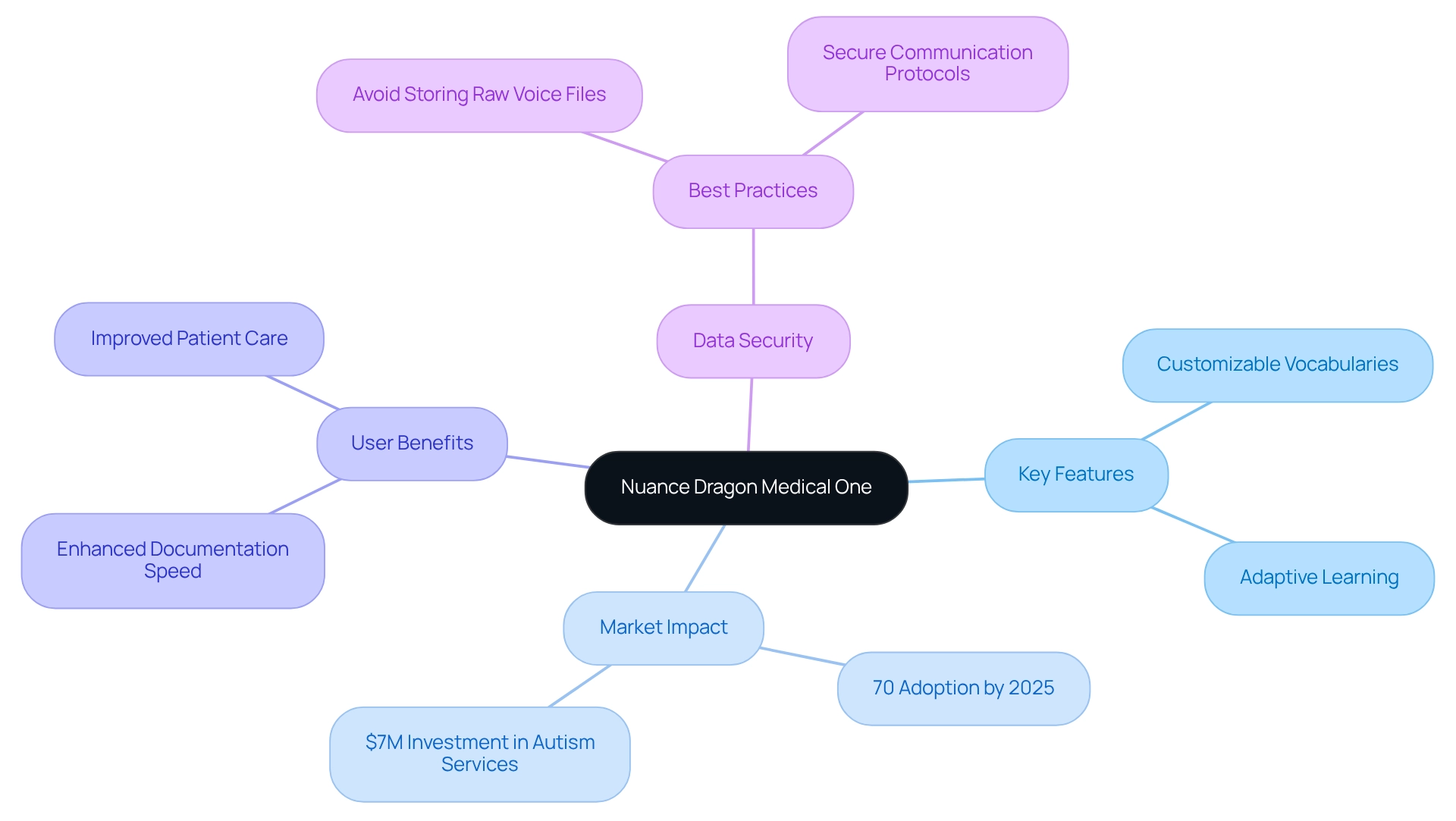
Google Docs Voice Typing: Free and Accessible Transcription for Healthcare Providers
Google Docs Voice Typing is a valuable tool offering medical speech to text free for healthcare professionals navigating the complexities of transcription. This feature, available through the Chrome browser, allows users to dictate notes directly into a document, making it easier to create and edit patient records in real-time. While it may lack some advanced features found in , its user-friendly interface and the option for medical speech to text free make it a popular choice for those looking to improve their record-keeping processes.
As we look towards 2025, the adoption of Google Docs Voice Typing within the medical community is steadily increasing. Many professionals are acknowledging its potential to enhance efficiency. A recent study reveals that nearly 30% of medical providers are embracing voice typing tools to streamline their documentation, illustrating a growing trend towards integrating technology in clinical environments. This trend is further underscored by the significant market shares held by digital assistants like Amazon Alexa and Microsoft Cortana, at 25% and 19%, respectively, reflecting a broader acceptance of voice technology across various fields.
Healthcare facilities that have implemented Google Docs Voice Typing are experiencing notable time savings, allowing clinicians to focus more on patient care rather than administrative duties. By automating record-keeping tasks, healthcare professionals can alleviate the burden of time-consuming responsibilities, ultimately enhancing the quality of care provided to individuals. Additionally, a case study on data security in medical transcription highlights the importance of adhering to regulations like GDPR, ensuring that personal information remains confidential and secure, which builds trust in AI-driven transcription services. Experts suggest that while tools for medical speech to text free, like Google Docs Voice Typing, may not fully replace dedicated medical transcription software, they offer significant advantages, especially for smaller practices or those with budget constraints. Matthias Zuchowski notes, "Acceptance of speech recognition software among clinicians is limited, which may be partly explained by misconceptions about the accuracy of this technology."
The advantages of using Google Docs Voice Typing for medical records are clear: improved accuracy in documentation, reduced transcription time, and enhanced accessibility for providers on the go. As healthcare services evolve, tools like Google Docs Voice Typing are becoming essential for maintaining efficient and effective care. This aligns with the mission of organizations like CosmaNeura, which prioritize ethical practices and the integration of technology in medical services. How can you leverage these tools to enhance your practice and support your patients better?
Otter.ai: Real-Time Transcription and Collaboration for Healthcare Teams
In the demanding world of healthcare, providers often face overwhelming administrative burdens that can detract from the quality of patient care. How often do you find yourself buried in documentation instead of focusing on your patients? Otter.ai offers a compassionate solution with its real-time transcription services, designed to enhance collaboration among healthcare teams. By accurately recording discussions and creating concise summaries, it ensures that team members remain in sync during critical care conversations.
Key features such as speaker identification and seamless integration with video conferencing tools allow for effective communication and meticulous record-keeping. This not only streamlines the sharing of insights but also plays a crucial role in improving patient outcomes. Imagine regaining precious time that you can dedicate to providing high-quality care, rather than getting lost in time-consuming tasks like documentation and appointment scheduling.
has experienced a notable growth rate of 9.2% from 2019 to 2023, reflecting an increasing demand for such services. Yet, this market is not without its challenges, including data security concerns and the need to comply with ever-evolving data protection regulations. As the need for real-time transcription tools continues to rise, with projections indicating significant usage increases by 2025, Otter.ai emerges as an essential resource for fostering collaboration and enhancing the quality of care, particularly through medical speech to text free options. According to Viraj Mahajan, the medical transcription market size is expected to grow from $2.55 billion in 2024 to $8.41 billion by the end of 2032, at a CAGR of 16.1%. This underscores the vital role of tools like Otter.ai in navigating the changing landscape of healthcare. Let’s embrace these innovations together, ensuring that we can focus more on what truly matters—our patients.
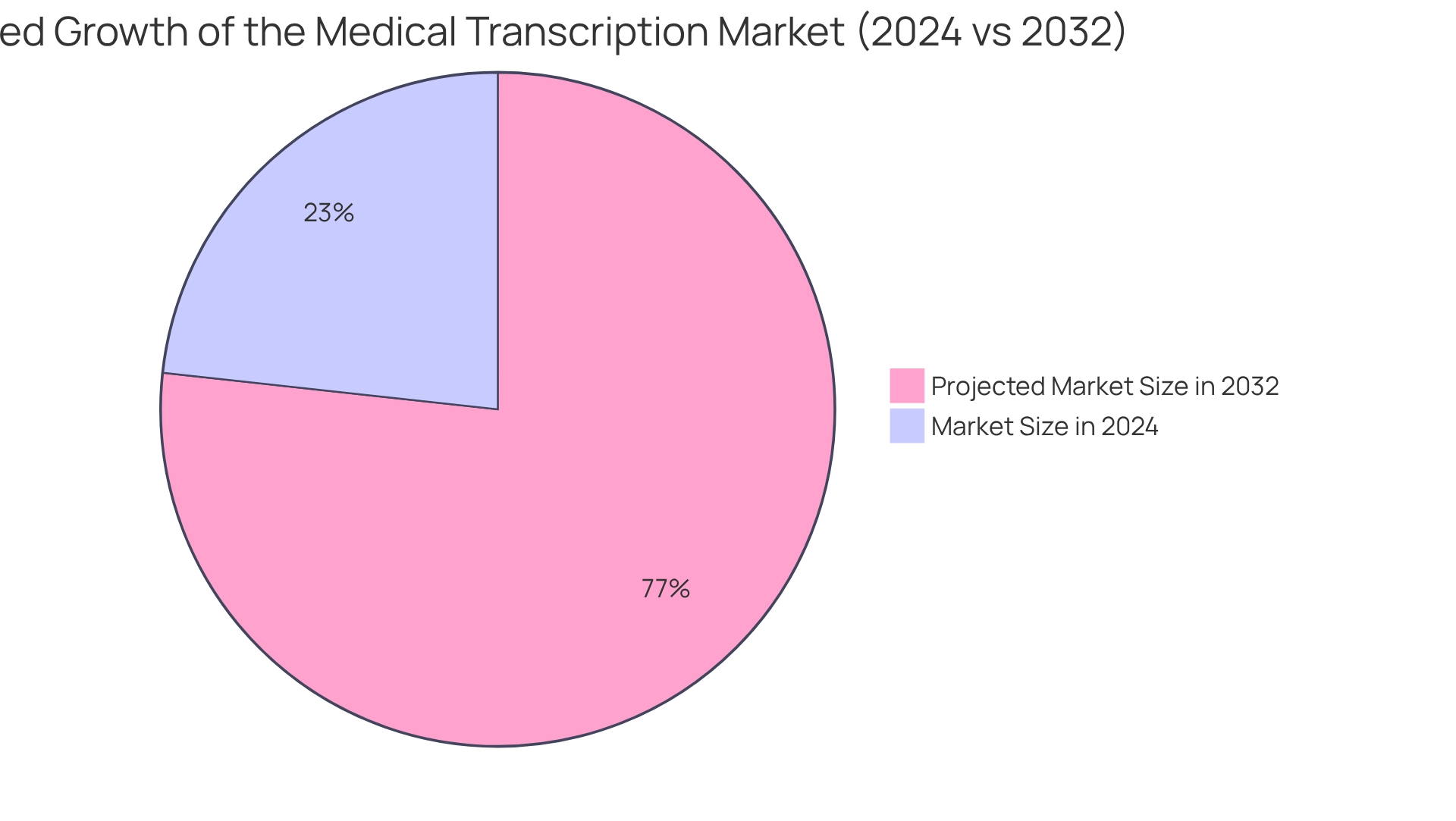
Microsoft Dictate: Seamless Integration with Office for Efficient Transcription
Microsoft Dictate is a compassionate tool designed to assist medical professionals by providing a medical speech to text free option for dictating documents directly within Microsoft Office applications like Word and Outlook. This seamless integration alleviates the burdens of record-keeping, enabling users to take advantage of medical speech to text free for creating notes, emails, and reports hands-free.
With its remarkable precision, multilingual support, and robust privacy safeguards—ensuring that audio data and transcribed text are not retained—Microsoft Dictate stands out as an exceptional choice for providers seeking to enhance productivity while upholding strict record-keeping standards, particularly due to its medical speech to text free capabilities that have been enriched in the 2025 updates, making it an invaluable resource in healthcare environments. The tool's ability to automate documentation not only saves precious time but also reduces the administrative load on clinicians, allowing them to focus more on patient care.
Have you ever felt overwhelmed by paperwork? Case studies, including those from CosmaNeura, illustrate how AI solutions like Microsoft Dictate can lead to significant time savings, improved job satisfaction, and better outcomes by alleviating administrative tasks. This aligns with the broader goal of through optimized administrative efficiency.
Moreover, the integration of dictation tools within Office applications has been linked to increased productivity among medical professionals. As the demand for effective record-keeping continues to rise, Microsoft Dictate remains at the forefront, offering a reliable medical speech to text free solution that adapts to the evolving needs of the medical sector. This is particularly relevant for faith-oriented providers committed to delivering compassionate care while adhering to ethical guidelines.
Additionally, the emergence of ambient clinical intelligence as a means to automate EHR data entry through AI further enhances the capabilities of Microsoft Dictate, reinforcing its role in improving documentation efficiency and alleviating physician burnout.
However, medical startups often encounter hurdles in embracing such innovative solutions due to concerns about maintaining quality care and meaningful patient interactions. Addressing these valid concerns is crucial for the successful integration of AI tools like Microsoft Dictate in medical settings. How can we ensure that technology enhances rather than detracts from the patient experience? By fostering open dialogue and understanding, we can navigate these challenges together.
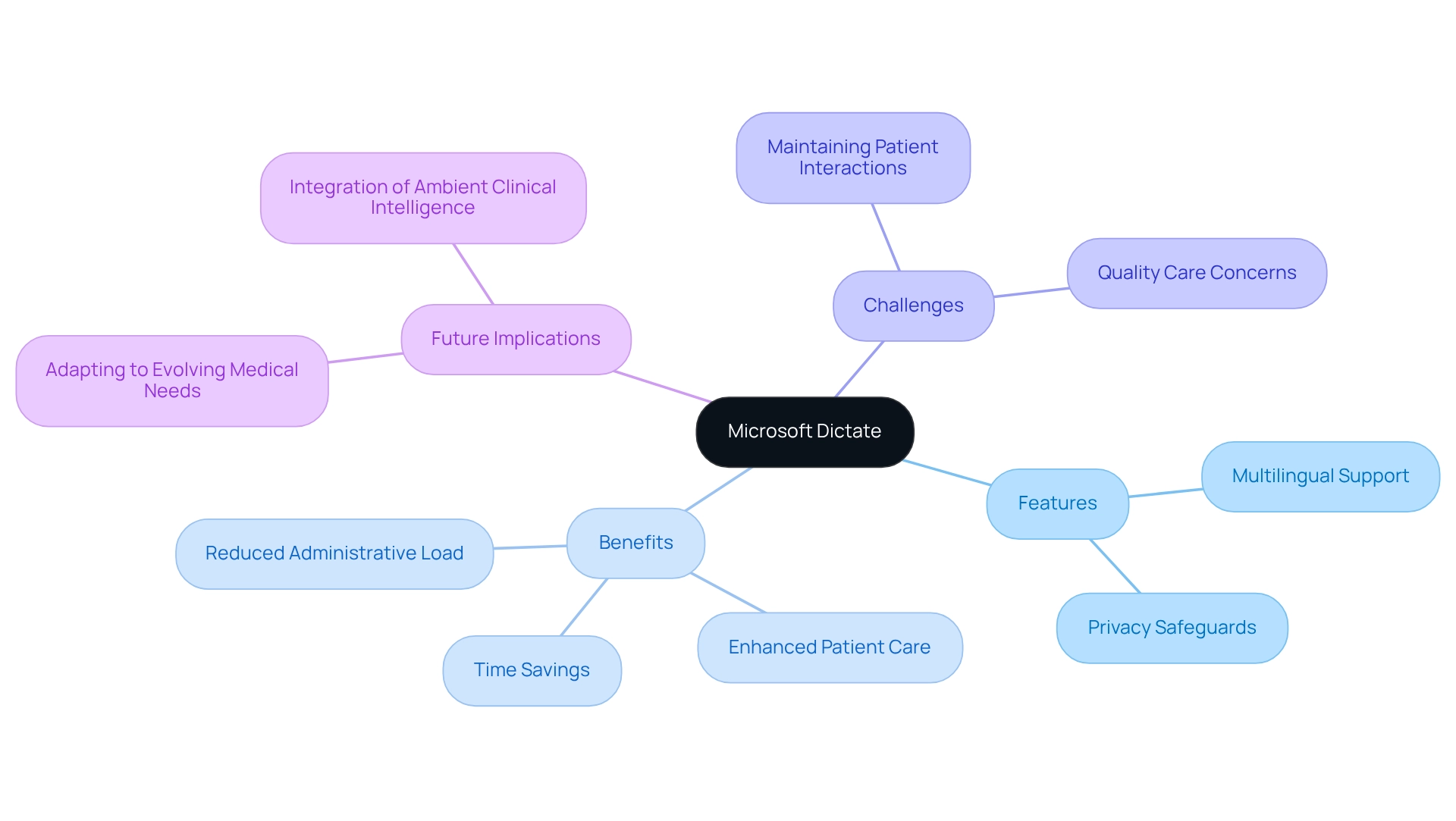
Apple Dictation: Built-In Transcription for iOS and macOS Users
Apple Dictation, a built-in feature on iOS and macOS devices, empowers healthcare professionals to dictate text effortlessly wherever typing is possible. This functionality is invaluable for those who need to document client interactions or notes swiftly while on the move. By simplifying record-keeping procedures, Apple Dictation alleviates the burden of laborious administrative tasks, allowing practitioners to reclaim precious time to focus on delivering excellent care to their patients. With advanced voice commands for punctuation and formatting, Apple Dictation significantly enhances documentation efficiency, reportedly increasing it by 36% compared to traditional typing methods. This means practitioners can devote their attention to patient care without the distraction of manual entry.
In 2025, the adoption of Apple Dictation among healthcare providers surged, reflecting its effectiveness in enhancing workflow. Its integration into clinical practice not only streamlines record-keeping but also meets the growing need for . However, a thorough assessment of medical speech to text free systems is essential to ensure they improve rather than hinder clinical record-keeping tasks. Recent studies emphasize that effective medical speech to text free tools can significantly enhance recording speed and precision, which is crucial for patient care.
Case studies reveal that medical practitioners using Apple Dictation experience improved record-keeping speed and accuracy, ultimately leading to better patient outcomes. As Dr. Rupesh, a radiologist, shared, "Augnito’s compatibility with Mac systems and its ability to integrate seamlessly into a multiple monitor setup allows navigation of documents without interrupting dictation." This perspective highlights the importance of usability in dictation tools, which can significantly ease the workload of healthcare providers.
The integrated dictation capabilities of iOS and macOS devices are particularly beneficial for rapid record-keeping, enabling users to gather essential information instantly. As mobile dictation tools continue to evolve, their impact on medical record-keeping becomes increasingly significant, fostering a more efficient and responsive medical environment. Furthermore, ongoing research into the various dimensions of speech recognition technology will be vital in understanding its full potential and limitations in clinical settings.
Deepgram: Customizable Speech-to-Text API for Medical Applications
Deepgram provides to text free API specifically designed for medical applications, making it a compassionate choice for healthcare providers. Its advanced AI capabilities allow practices to personalize the transcription process, ensuring high accuracy and operational efficiency. By alleviating administrative burdens such as record-keeping, appointment scheduling, and medical record management, Deepgram significantly enhances workflow. This enables physicians to reclaim valuable time, allowing them to focus on delivering quality care to their patients.
The speech-to-text API market is experiencing a surge in demand, with projections indicating a growing need for medical speech to text free solutions that are scalable and accessible across various sectors, including medical services. This trend underscores the importance of integrating AI technologies like Deepgram into medical practices, which offer medical speech to text free options to combat physician burnout and enhance patient care. Recent collaborations, such as the partnership between Clarifai and Deepgram, aim to unite AI capabilities for the swift development of voice applications. This is expected to improve the functionality and accessibility of speech-to-text solutions, ultimately benefiting medical professionals.
As Microsoft Corporation observed, "Through the acquisition, Nuance's best-in-class conversational AI and ambient intelligence are integrated with Microsoft's safe and trusted industry cloud capabilities," emphasizing the crucial role of accuracy in medical transcription technology. By leveraging Deepgram's capabilities, medical practitioners can streamline workflows while using medical speech to text free to ensure precise and reliable documentation. This is vital for maintaining high standards of care and addressing the resistance to innovation often faced in the medical field.
Imagine the relief of having more time to connect with patients and provide the care they truly deserve. Deepgram is here to support you in overcoming these challenges, enhancing your practice, and ultimately improving patient outcomes.
Gboard: Versatile Voice Typing for Mobile Healthcare Providers
Gboard, Google's innovative keyboard application, includes a medical speech to text free feature that allows healthcare professionals to dictate text effortlessly into any app on their mobile devices. Have you ever felt overwhelmed by the need to record client interactions while on the go? This functionality is especially beneficial for providers facing the challenges of busy schedules. By automating administrative tasks such as appointment scheduling and medical record management, Gboard lightens the load of time-consuming work, enabling physicians to reclaim precious time to focus on delivering high-quality care to their patients.
With its intuitive interface and dependable performance, Gboard significantly boosts the effectiveness of mobile record-keeping. In fact, the use of medical speech to text free software for medical dictation can by 36%, saving approximately 21.6 minutes every hour. Imagine the difference this could make—healthcare specialists can dedicate more time to client care, leading to heightened satisfaction levels among practitioners. A notable quote states, "Documenting with dictation software led to a dramatic increase in user satisfaction," highlighting the positive impact of these tools.
Furthermore, using medical speech to text free applications like Gboard can reduce errors in recording, ensuring accuracy in patient records. The ability to record while on the move not only simplifies workflows but also aligns with the growing demand for portable solutions in medical record-keeping. Gboard stands out as an essential tool for today’s medical practitioners. Why not explore how it can transform your practice and enhance your patient interactions?
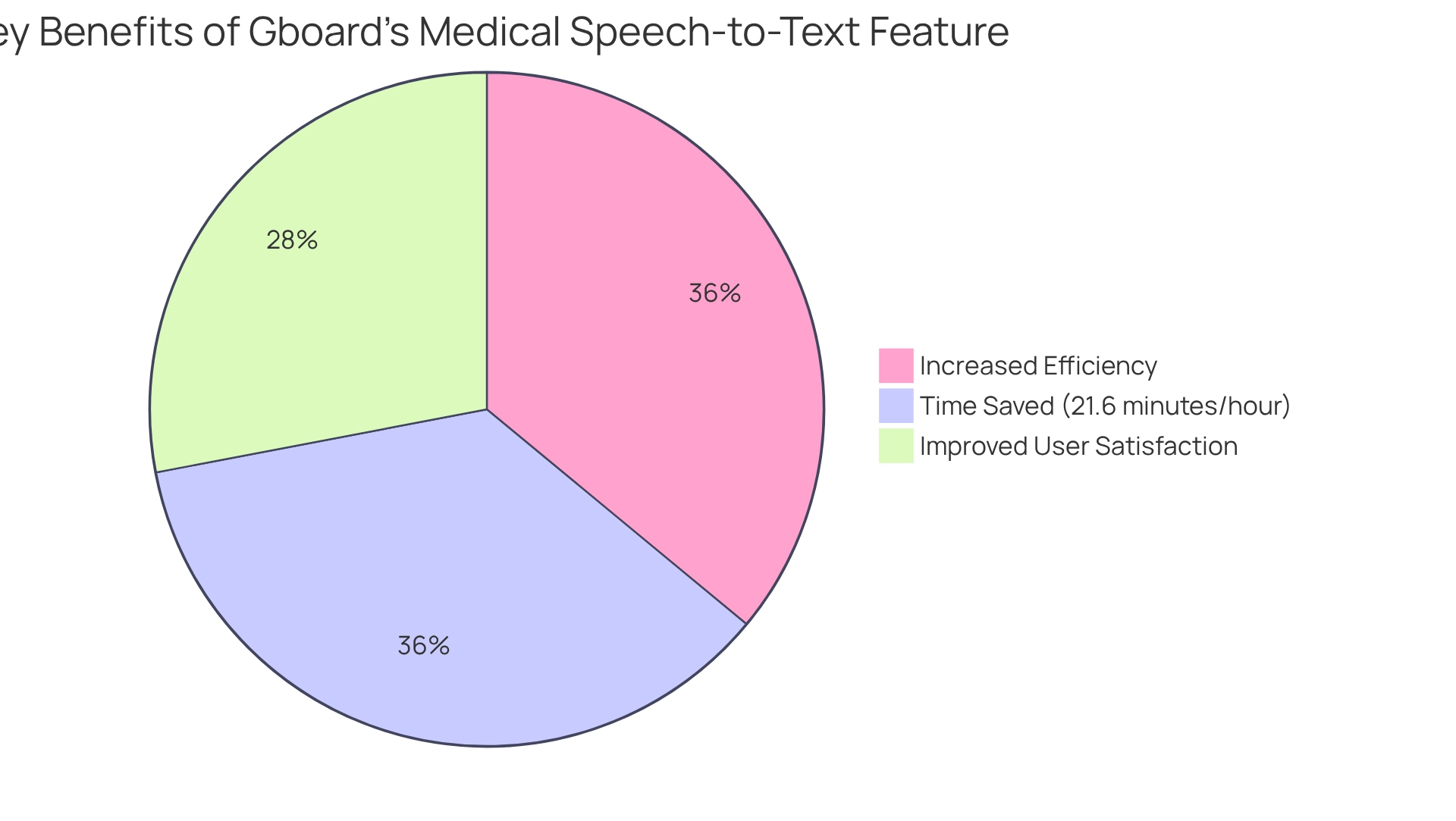
Just Press Record: Instant Audio Recording and Transcription for On-the-Go Providers
Just Press Record is a revolutionary mobile app designed specifically for medical professionals, enabling medical speech to text free with immediate audio recording and transcription via a simple one-tap function. This feature empowers professionals to effortlessly capture client interactions or notes, all without disrupting their workflow.
Imagine how much more efficient record-keeping could be through medical speech to text free solutions, enhancing the care you provide. As we look to 2025, the demand for mobile audio recording applications in healthcare continues to rise, driven by the urgent need for effective record-keeping solutions. Immediate audio recording not only streamlines this process but also enriches the quality of patient interactions. By enabling practitioners to focus on care rather than note-taking, we can truly make a difference.
Research indicates that 50% of doctors utilize evidence-based clinical tools at the point of care, underscoring the importance of effective recording tools, such as medical speech to text free applications, in bolstering clinical decision-making; the Just Press Record app features high-quality audio capture and automatic transcription tailored for medical professionals. These capabilities can save clinicians invaluable time. By alleviating the administrative burdens associated with paperwork, you can reclaim hours previously spent on routine tasks, leading to increased job satisfaction and .
This aligns with the broader trend of integrating AI solutions in medicine, which aim to relieve pressures on practitioners and enhance care delivery. Case studies reveal that medical professionals using a medical speech to text free tool like Just Press Record experience a marked improvement in documentation efficiency, resulting in more accurate and timely records for patients.
It's important to note that mobile health apps are often categorized into wellness and medical apps, with a significant majority focusing on wellness. This distinction highlights the diverse applications of mobile health technology, catering to the needs of both patients and providers, as tools like Just Press Record, a medical speech to text free option, become essential for professionals striving to enhance their practice while upholding the highest standards of care.
In an environment where innovation may face resistance, addressing concerns and showcasing tangible benefits is crucial. Such tools can bridge the gap between traditional practices and modern technological solutions, ultimately fostering a more compassionate and effective healthcare experience.
Dictanote: Comprehensive Dictation and Note-Taking Tool for Healthcare Professionals
In the demanding world of healthcare, medical professionals often grapple with overwhelming administrative burdens that can detract from the quality of patient care. Dictanote emerges as a powerful ally in this struggle, offering a medical speech to text free dictation and note-taking tool specifically designed for their needs. With medical speech to text free capabilities in over 50 languages, it offers the flexibility to switch seamlessly between typing and voice input, enabling prompt and precise documentation of patient details.
Imagine the relief of being able to enhance workflow efficiency while ensuring patient involvement. In 2025, reported utilizing a medical speech to text free solution like Dictanote to improve their documentation processes, with numerous users highlighting increased accuracy and reduced administrative burdens. A case study titled 'Physician Perspectives on Voice AI' reveals that 65% of physicians believe that medical speech to text free tools like Dictanote can significantly enhance their workflow efficiency, showcasing the transformative potential of such technologies in clinical practices.
However, it’s essential to acknowledge the concerns that come with innovation. About 57% of respondents expressed fears that their relationship with medical providers might suffer due to AI, reflecting a common apprehension about technology in the medical field. As Aman Mehta, Content & Communications Specialist, wisely noted, 'The human touch in medical services will always be essential, but it may be enhanced by the strength of our voice.' This sentiment underscores the importance of preserving the human element in patient care while embracing the advantages of AI tools.
Furthermore, with 50% of EU healthcare professionals confident that AI will improve treatment quality, Dictanote offers a medical speech to text free tool that not only streamlines documentation but also addresses the challenges of resistance to innovation in healthcare. It empowers providers to uphold high standards of care while effectively managing their documentation needs. Embrace the change that Dictanote offers—your patients deserve the best care, and with the right tools, you can provide it.
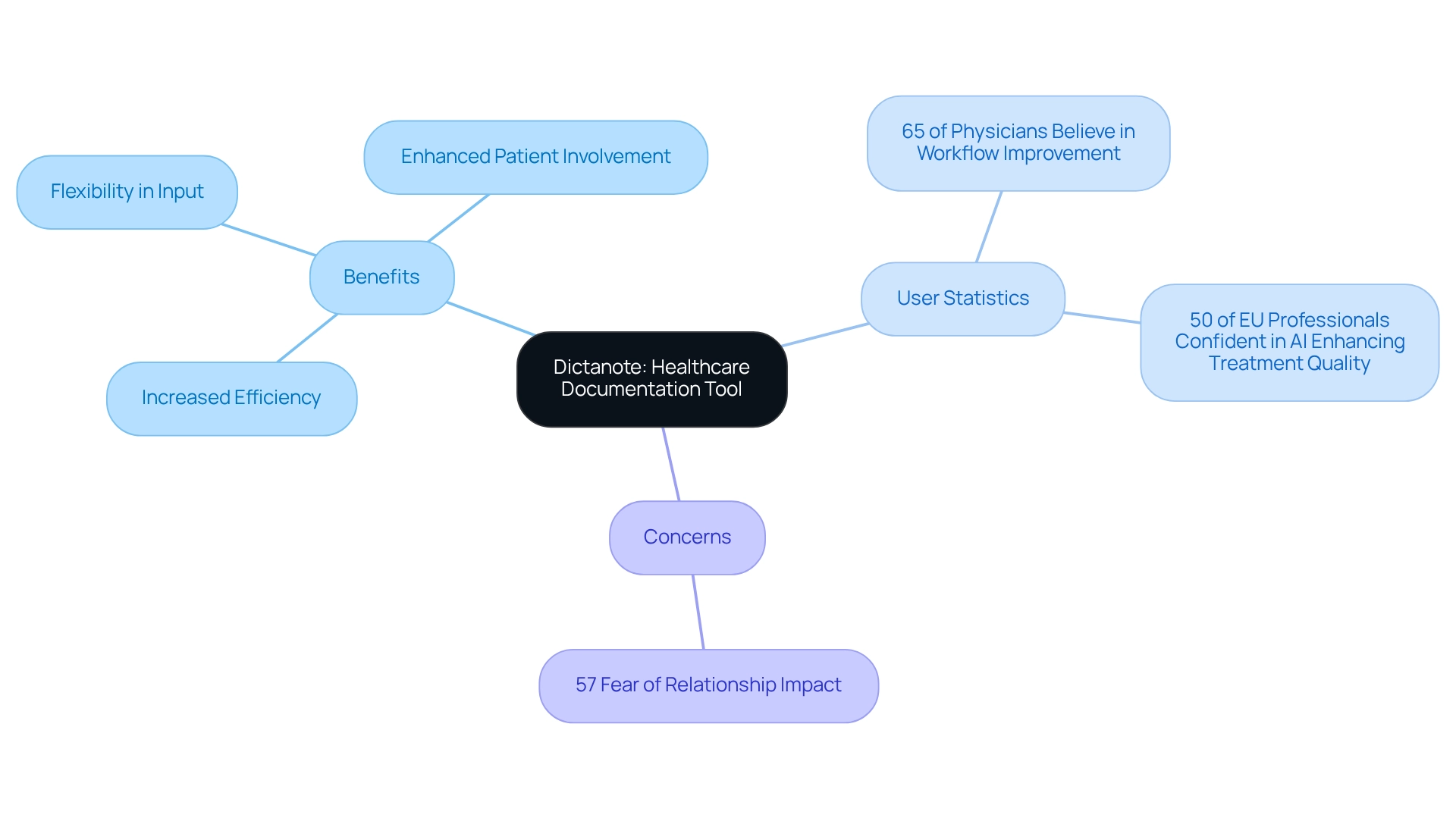
Conclusion
The integration of advanced transcription and dictation tools in healthcare is not just a technological advancement; it’s a transformative force in patient care and administrative efficiency. Platforms like CosmaNeura, which align with ethical practices, alongside Nuance Dragon Medical One's sophisticated speech recognition capabilities, are designed to streamline workflows and enhance the quality of care provided. As healthcare providers increasingly adopt these tools, they experience significant improvements in documentation speed and accuracy. This shift allows them to devote more time to meaningful patient interactions rather than getting bogged down by administrative tasks.
Moreover, the rise of user-friendly options such as Google Docs Voice Typing and Gboard reflects a growing trend toward accessible solutions that cater to the needs of healthcare professionals on the go. Tools like Otter.ai and Just Press Record further facilitate real-time collaboration and instant transcription, ensuring that teams remain aligned and informed during patient care discussions. This evolution not only alleviates the administrative burden but also fosters a more responsive and effective healthcare environment.
As the healthcare sector continues to evolve, embracing these innovative technologies is crucial for improving patient outcomes and enhancing overall satisfaction among providers. The successful integration of AI-driven solutions addresses the challenges of documentation while reinforcing the importance of maintaining the human touch in patient care. By leveraging these advancements, healthcare professionals can navigate the complexities of modern practice with greater efficiency and compassion. This ultimately leads to a healthier future for both providers and patients alike. So let’s continue to embrace these tools, nurturing a healthcare environment where compassion and technology go hand in hand.




